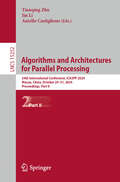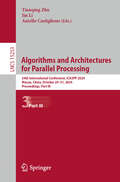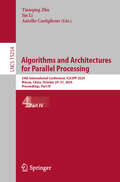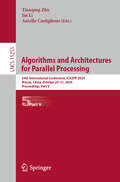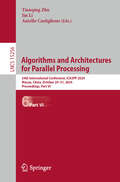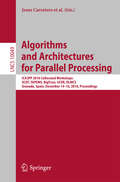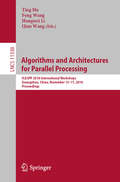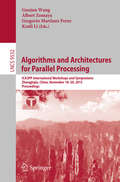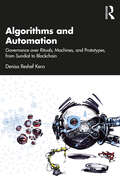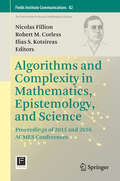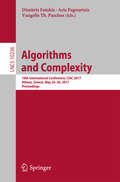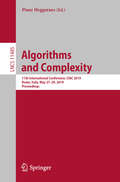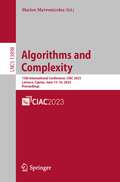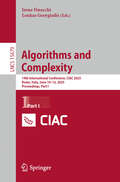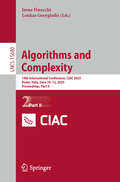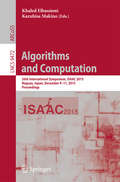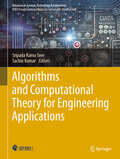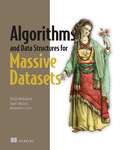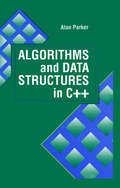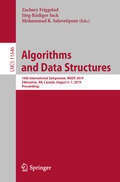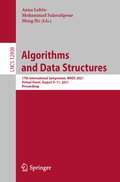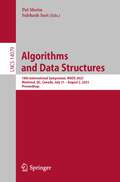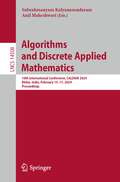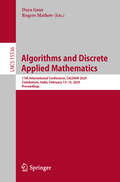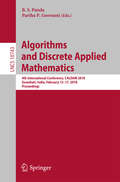- Table View
- List View
Algorithms and Architectures for Parallel Processing: 24th International Conference, ICA3PP 2024, Macau, China, October 29–31, 2024, Proceedings, Part II (Lecture Notes in Computer Science #15252)
by Jin Li Aniello Castiglione Tianqing ZhuThe six-volume set, LNCS 15251-15256, constitutes the refereed proceedings of the 24th International Conference on Algorithms and Architectures for Parallel Processing, ICA3PP 2024, held in Macau, China, during October 29–31, 2024. The 91 full papers, 35 short papers and 5 workshop papers included in these proceedings were carefully reviewed and selected from 265 submissions. They focus on the many dimensions of parallel algorithms and architectures, encompassing fundamental theoretical approaches, practical experimental projects, and commercial components and systems.
Algorithms and Architectures for Parallel Processing: 24th International Conference, ICA3PP 2024, Macau, China, October 29–31, 2024, Proceedings, Part III (Lecture Notes in Computer Science #15253)
by Jin Li Aniello Castiglione Tianqing ZhuThe six-volume set, LNCS 15251-15256, constitutes the refereed proceedings of the 24th International Conference on Algorithms and Architectures for Parallel Processing, ICA3PP 2024, held in Macau, China, during October 29–31, 2024. The 91 full papers, 35 short papers and 5 workshop papers included in these proceedings were carefully reviewed and selected from 265 submissions. They focus on the many dimensions of parallel algorithms and architectures, encompassing fundamental theoretical approaches, practical experimental projects, and commercial components and systems.
Algorithms and Architectures for Parallel Processing: 24th International Conference, ICA3PP 2024, Macau, China, October 29–31, 2024, Proceedings, Part IV (Lecture Notes in Computer Science #15254)
by Jin Li Aniello Castiglione Tianqing ZhuThe six-volume set, LNCS 15251-15256, constitutes the refereed proceedings of the 24th International Conference on Algorithms and Architectures for Parallel Processing, ICA3PP 2024, held in Macau, China, during October 29–31, 2024. The 91 full papers, 35 short papers and 5 workshop papers included in these proceedings were carefully reviewed and selected from 265 submissions. They focus on the many dimensions of parallel algorithms and architectures, encompassing fundamental theoretical approaches, practical experimental projects, and commercial components and systems.
Algorithms and Architectures for Parallel Processing: 24th International Conference, ICA3PP 2024, Macau, China, October 29–31, 2024, Proceedings, Part V (Lecture Notes in Computer Science #15255)
by Jin Li Aniello Castiglione Tianqing ZhuThe six-volume set, LNCS 15251-15256, constitutes the refereed proceedings of the 24th International Conference on Algorithms and Architectures for Parallel Processing, ICA3PP 2024, held in Macau, China, during October 29–31, 2024. The 91 full papers, 35 short papers and 5 workshop papers included in these proceedings were carefully reviewed and selected from 265 submissions. They focus on the many dimensions of parallel algorithms and architectures, encompassing fundamental theoretical approaches, practical experimental projects, and commercial components and systems.
Algorithms and Architectures for Parallel Processing: 24th International Conference, ICA3PP 2024, Macau, China, October 29–31, 2024, Proceedings, Part VI (Lecture Notes in Computer Science #15256)
by Jin Li Aniello Castiglione Tianqing ZhuThe six-volume set, LNCS 15251-15256, constitutes the refereed proceedings of the 24th International Conference on Algorithms and Architectures for Parallel Processing, ICA3PP 2024, held in Macau, China, during October 29–31, 2024. The 91 full papers, 35 short papers and 5 workshop papers included in these proceedings were carefully reviewed and selected from 265 submissions. They focus on the many dimensions of parallel algorithms and architectures, encompassing fundamental theoretical approaches, practical experimental projects, and commercial components and systems.
Algorithms and Architectures for Parallel Processing: ICA3PP 2016 Collocated Workshops: SCDT, TAPEMS, BigTrust, UCER, DLMCS, Granada, Spain, December 14-16, 2016, Proceedings (Lecture Notes in Computer Science #10049)
by José Gracia Josef Weidendorfer Jesus Carretero Javier Garcia-Blas Victor Gergel Vladimir Voevodin Iosif Meyerov Juan A. Rico-Gallego Juan C. Díaz-Martín Pedro Alonso Juan Durillo José Daniel Garcia Sánchez Alexey L. Lastovetsky Fabrizio Marozzo Qin Liu Zakirul Alam Bhuiyan Karl FürlingerThis book constitutes the refereed workshop proceedings of the 16th International Conference on Algorithms and Architectures for Parallel Processing, ICA3PP 2016, held in Granada, Spain, in December 2016. The 30 full papers presented were carefully reviewed and selected from 58 submissions. They cover many dimensions of parallel algorithms and architectures, encompassing fundamental theoretical approaches, practical experimental projects, and commercial components and systems trying to push beyond the limits of existing technologies, including experimental efforts, innovative systems, and investigations that identify weaknesses in existing parallel processing technology.
Algorithms and Architectures for Parallel Processing: ICA3PP 2018 International Workshops, Guangzhou, China, November 15-17, 2018, Proceedings (Lecture Notes in Computer Science #11338)
by Feng Wang Qian Wang Hongwei Li Ting HuThis book constitutes the workshop proceedings of the 18th International Conference on Algorithms and Architectures for Parallel Processing, ICA3PP 2018, held in Guangzhou, China, in November 2018. The 24 full papers presented were carefully selected and reviewed from numerous submissions to the two following workshops: - ICA3PP 2018 Workshop on Intelligent Algorithms for Large-scale Complex Optimization Problems - ICA3PP 2018 Workshop on Security and Privacy in Data Processing
Algorithms and Architectures for Parallel Processing: ICA3PP International Workshops and Symposiums, Zhangjiajie, China, November 18-20, 2015, Proceedings (Lecture Notes in Computer Science #9532)
by Albert Zomaya Kenli Li Guojin Wang Gregorio MartinezThis book constitutes the refereed proceedings of theWorkshops and Symposiums of the 15th International Conference on Algorithms andArchitectures for Parallel Processing, ICA3PP 2015, held in Zhangjiajie, China,in November 2015. The program of this year consists of 6symposiums/workshops that cover a wide range of research topics on parallelprocessing technology: the Sixth International Workshop on Trust, Security andPrivacy for Big Data, TrustData 2015; the Fifth International Symposium onTrust, Security and Privacy for Emerging Applications, TSP 2015; the ThirdInternational Workshop on Network Optimization and Performance Evaluation, NOPE2015; the Second International Symposium on Sensor-Cloud Systems, SCS 2015; theSecond International Workshop on Security and Privacy Protection in Computerand Network Systems, SPPCN 2015; and the First International Symposium onDependability in Sensor, Cloud, and Big Data Systems and Applications,DependSys 2015. The aim of these symposiums/workshops is to provide aforum to bring together practitioners and researchers from academia andindustry for discussion and presentations on the current research and futuredirections related to parallel processing technology. The themes and topics ofthese symposiums/workshops are a valuable complement to the overall scope ofICA3PP 2015 and give additional values and interests.
Algorithms and Automation: Governance over Rituals, Machines, and Prototypes, from Sundial to Blockchain
by Denisa Reshef KeraTo enact the book’s central theme of automation and human agency, the author designed a Bot trained on her book to support dialogue with the content and facilitate discussions. If you like to compare what the author says and Bot ‘interprets’ or generates, go here https://www.anonette.net/denisaBot/ Algorithms and Automation: Governance over Rituals, Machines, and Prototypes, from Sundial to Blockchain is a critical examination of the history and impact of automation on society. It provides thought-provoking perspectives on the history of automation and its relationship with power, emphasizing the importance of considering the social context in which automation is developed and used. The book argues that automation has always been a political and social force that shapes our lives and futures, rather than a neutral tool. The author provides a genealogy of automation, tracing its development from ancient rituals to modern-day prototypes, and highlights the challenges posed by new technologies such as blockchain and artificial intelligence. The volume argues that we need more democratic and accountable governance over technological innovation to ensure that it respects human rights, political pluralism, legitimacy, and other values we hold dear in our institutions and political processes. An engaging read on a fascinating topic, this book will be indispensable for scholars, students, and researchers of science and technology studies, digital humanities, politics and governance, public policy, social policy, system design and automation, and history and philosophy of science and technology. It will also be of interest to readers interested in the interactions of the sciences and the social sciences and humanities.
Algorithms and Complexity in Mathematics, Epistemology, and Science: Proceedings of 2015 and 2016 ACMES Conferences (Fields Institute Communications #82)
by Ilias S. Kotsireas Robert M. Corless Nicolas FillionACMES (Algorithms and Complexity in Mathematics, Epistemology, and Science) is a multidisciplinary conference series that focuses on epistemological and mathematical issues relating to computation in modern science. This volume includes a selection of papers presented at the 2015 and 2016 conferences held at Western University that provide an interdisciplinary outlook on modern applied mathematics that draws from theory and practice, and situates it in proper context. These papers come from leading mathematicians, computational scientists, and philosophers of science, and cover a broad collection of mathematical and philosophical topics, including numerical analysis and its underlying philosophy, computer algebra, reliability and uncertainty quantification, computation and complexity theory, combinatorics, error analysis, perturbation theory, experimental mathematics, scientific epistemology, and foundations of mathematics. By bringing together contributions from researchers who approach the mathematical sciences from different perspectives, the volume will further readers' understanding of the multifaceted role of mathematics in modern science, informed by the state of the art in mathematics, scientific computing, and current modeling techniques.
Algorithms and Complexity: 10th International Conference, CIAC 2017, Athens, Greece, May 24-26, 2017, Proceedings (Lecture Notes in Computer Science #10236)
by Dimitris Fotakis, Aris Pagourtzis and Vangelis Th. PaschosThis book constitutes the refereed conference proceedings of the 10th International Conference on Algorithms and Complexity, CIAC 2017, held in Athens, Greece, in May 2017.The 36 revised full papers were carefully reviewed and selected from 90 submissions and are presented together with 3 abstracts of invited talks and a paper to the 70th birthday of Stathis Zachos. The papers present original research in the theory and applications of algorithms and computational complexity.
Algorithms and Complexity: 11th International Conference, CIAC 2019, Rome, Italy, May 27–29, 2019, Proceedings (Lecture Notes in Computer Science #11485)
by Pinar HeggernesThis book constitutes the refereed conference proceedings of the 11th International Conference on Algorithms and Complexity, CIAC 2019, held in Rome, Italy, in May 2019. The 30 full papers were carefully reviewed and selected from 95 submissions. The International Conference on Algorithms and Complexity is intended to provide a forum for researchers working in all aspects of computational complexity and the use, design, analysis and experimentation of efficient algorithms and data structures. The papers present original research in the theory and applications of algorithms and computational complexity.
Algorithms and Complexity: 13th International Conference, CIAC 2023, Larnaca, Cyprus, June 13–16, 2023, Proceedings (Lecture Notes in Computer Science #13898)
by Marios MavronicolasThis book constitutes the refereed proceedings of the 13th International Conference on Algorithms and Complexity, CIAC 2023, which took place in Larnaca, Cyprus, during June 13–16, 2023. The 25 full papers included in this book were carefully reviewed and selected from 49 submissions. They cover all important areas of research on algorithms and complexity such as algorithm design and analysis; sequential, parallel and distributed algorithms; data structures; computational and structural complexity; lower bounds and limitations of algorithms; randomized and approximation algorithms; parameterized algorithms and parameterized complexity classes; smoothed analysis of algorithms; alternatives to the worst-case analysis of algorithms (e.g., algorithms with predictions), on-line computation and competitive analysis, streaming algorithms, quantum algorithms and complexity, algorithms in algebra, geometry, number theory and combinatorics, computational geometry, algorithmic game theory and mechanism design, algorithmic economics (including auctions and contests), computational learning theory, computational biology and bioinformatics, algorithmic issues in communication networks, algorithms for discrete optimization (including convex optimization) and algorithm engineering.
Algorithms and Complexity: 14th International Conference, CIAC 2025, Rome, Italy, June 10–12, 2025, Proceedings, Part I (Lecture Notes in Computer Science #15679)
by Irene Finocchi Loukas GeorgiadisThe two-volume set LNCS 15679 and 15680 constitutes the refereed proceedings of the 14th International Conference on Algorithms and Complexity, CIAC 2025, held in Rome, Italy, during June 10–12, 2025.The 44 full papers included in these proceedings were carefully reviewed and selected from 110 submissions. They focus on all aspects of important venue for researchers working on computational complexity and the design, analysis, experimentation, and application of efficient algorithms and data structures.
Algorithms and Complexity: 14th International Conference, CIAC 2025, Rome, Italy, June 10–12, 2025, Proceedings, Part II (Lecture Notes in Computer Science #15680)
by Irene Finocchi Loukas GeorgiadisThe two-volume set LNCS 15679 and 15680 constitutes the refereed proceedings of the 14th International Conference on Algorithms and Complexity, CIAC 2025, held in Rome, Italy, during June 10–12, 2025.The 44 full papers included in these proceedings were carefully reviewed and selected from 110 submissions. They focus on all aspects of important venue for researchers working on computational complexity and the design, analysis, experimentation, and application of efficient algorithms and data structures.
Algorithms and Computation: 26th International Symposium, ISAAC 2015, Nagoya, Japan, December 9-11, 2015, Proceedings (Lecture Notes in Computer Science #9472)
by Khaled Elbassioni Kazuhisa MakinoThis book constitutes the refereed proceedings of the 26th InternationalSymposium on Algorithms and Computation, ISAAC 2015, held in Nagoya, Japan, inDecember 2015. The 65 revised full papers presented together with 3 invited talks were carefullyreviewed and selected from 180 submissions for inclusion in the book. The focusof the volume is on the following topics: computational geometry; datastructures; combinatorial optimization and approximation algorithms; randomizedalgorithms; graph algorithms and FPT; computational complexity; graph drawingand planar graphs; online and streaming algorithms; and string and DNAalgorithms.
Algorithms and Computational Theory for Engineering Applications (Advances in Science, Technology & Innovation)
by Sachin Kumar Sripada Rama SreeThis book goes deeply into the world of algorithms and computational theory and its astounding influence on numerous engineering areas. The book's carefully chosen content highlights the most recent studies, approaches, and real-world applications that are revolutionising engineering. The book is structured into distinct sections, each of which examines an important topic in computational theory and algorithms. The authors propose cutting-edge optimisation methods that revolutionise the way engineers approach engineering problems by allowing them to solve complicated issues quickly and effectively. The book illustrates the techniques and equipment used in the fields of data science and big data analytics to glean insightful information from enormous databases. Data visualisation, predictive modelling, clustering, and anomaly detection are a few examples of how algorithms are used to find patterns and trends that help engineers make well-informed decisions. Before being physically implemented, complex systems are built, tested, and optimised in the virtual environment thanks to computational modelling and simulation. The book examines numerical techniques, finite element analysis, computational fluid dynamics, and other simulation techniques to highlight how algorithms are changing engineering system design and performance optimisation. The book also delves into the intriguing field of robotics and control systems. The book's readers will learn about the algorithms that advance sensor fusion, intelligent control, path planning, and real-time systems, paving the way for innovations in autonomous driving, industrial automation, and smart cities. Readers will learn more about how algorithms and computational theory are modifying engineering environments, opening up new opportunities, and changing industries by examining the book's chapters. This book is a must-have for anyone looking to keep on top of the intersection of algorithms, computational theory, and engineering applications because of its concentration on practical applications and theoretical breakthroughs.
Algorithms and Data Structures for Massive Datasets
by Dzejla Medjedovic Emin TahirovicMassive modern datasets make traditional data structures and algorithms grind to a halt. This fun and practical guide introduces cutting-edge techniques that can reliably handle even the largest distributed datasets.In Algorithms and Data Structures for Massive Datasets you will learn: Probabilistic sketching data structures for practical problems Choosing the right database engine for your application Evaluating and designing efficient on-disk data structures and algorithms Understanding the algorithmic trade-offs involved in massive-scale systems Deriving basic statistics from streaming data Correctly sampling streaming data Computing percentiles with limited space resources Algorithms and Data Structures for Massive Datasets reveals a toolbox of new methods that are perfect for handling modern big data applications. You&’ll explore the novel data structures and algorithms that underpin Google, Facebook, and other enterprise applications that work with truly massive amounts of data. These effective techniques can be applied to any discipline, from finance to text analysis. Graphics, illustrations, and hands-on industry examples make complex ideas practical to implement in your projects—and there&’s no mathematical proofs to puzzle over. Work through this one-of-a-kind guide, and you&’ll find the sweet spot of saving space without sacrificing your data&’s accuracy. About the technology Standard algorithms and data structures may become slow—or fail altogether—when applied to large distributed datasets. Choosing algorithms designed for big data saves time, increases accuracy, and reduces processing cost. This unique book distills cutting-edge research papers into practical techniques for sketching, streaming, and organizing massive datasets on-disk and in the cloud. About the book Algorithms and Data Structures for Massive Datasets introduces processing and analytics techniques for large distributed data. Packed with industry stories and entertaining illustrations, this friendly guide makes even complex concepts easy to understand. You&’ll explore real-world examples as you learn to map powerful algorithms like Bloom filters, Count-min sketch, HyperLogLog, and LSM-trees to your own use cases. What's inside Probabilistic sketching data structures Choosing the right database engine Designing efficient on-disk data structures and algorithms Algorithmic tradeoffs in massive-scale systems Computing percentiles with limited space resources About the reader Examples in Python, R, and pseudocode. About the author Dzejla Medjedovic earned her PhD in the Applied Algorithms Lab at Stony Brook University, New York. Emin Tahirovic earned his PhD in biostatistics from University of Pennsylvania. Illustrator Ines Dedovic earned her PhD at the Institute for Imaging and Computer Vision at RWTH Aachen University, Germany. Table of Contents 1 Introduction PART 1 HASH-BASED SKETCHES 2 Review of hash tables and modern hashing 3 Approximate membership: Bloom and quotient filters 4 Frequency estimation and count-min sketch 5 Cardinality estimation and HyperLogLog PART 2 REAL-TIME ANALYTICS 6 Streaming data: Bringing everything together 7 Sampling from data streams 8 Approximate quantiles on data streams PART 3 DATA STRUCTURES FOR DATABASES AND EXTERNAL MEMORY ALGORITHMS 9 Introducing the external memory model 10 Data structures for databases: B-trees, Bε-trees, and LSM-trees 11 External memory sorting
Algorithms and Data Structures in C++ (Computer Science And Engineering Ser. #5)
by Alan ParkerAlgorithms and Data Structures in C++ introduces modern issues in the theory of algorithms, emphasizing complexity, graphs, parallel processing, and visualization. To accomplish this, the book uses an appropriate subset of frequently utilized and representative algorithms and applications in order to demonstrate the unique and modern aspects of the C++ programming language. What makes this book so valuable is that many complete C++ programs have been compiled and executed on multiple platforms. Each program presented is a stand-alone functional program. A number of applications that exercise significant features of C++, including templates and polymorphisms, is included. The book is a perfect text for computer science and engineering students in traditional algorithms or data structures courses. It will also benefit professionals in all fields of computer science and engineering.
Algorithms and Data Structures: 16th International Symposium, WADS 2019, Edmonton, AB, Canada, August 5–7, 2019, Proceedings (Lecture Notes in Computer Science #11646)
by Jörg-Rüdiger Sack Zachary Friggstad Mohammad R. SalavatipourThis book constitutes the refereed proceedings of the 16th International Symposium on Algorithms and Data Structures, WADS, 2019, held in Edmonton, AB, Canada, in August 2019. The 42 full papers presented together with 3 invited lectures, we carefully reviewed and selected from a total of 88 submissions. They present original research on the theory and application of algorithms and data structures in many areas, including combinatorics, computational geometry, databases, graphics, and parallel and distributed computing.
Algorithms and Data Structures: 17th International Symposium, WADS 2021, Virtual Event, August 9–11, 2021, Proceedings (Lecture Notes in Computer Science #12808)
by Anna Lubiw Mohammad SalavatipourThis book constitutes the refereed proceedings of the 17th International Symposium on Algorithms and Data Structures, WADS 2021, held in virtually in August 2021. The 47 full papers, presented together with two invited lectures, were carefully reviewed and selected from a total of 123 submissions. They present original research on the theory, design and application of algorithms and data structures.
Algorithms and Data Structures: 18th International Symposium, WADS 2023, Montreal, QC, Canada, July 31 – August 2, 2023, Proceedings (Lecture Notes in Computer Science #14079)
by Subhash Suri Pat MorinThis book constitutes the refereed proceedings of the 18th International Symposium on Algorithms and Data Structures, WADS 2023, held during July 31-August 2, 2023. The 47 regular papers, presented in this book, were carefully reviewed and selected from a total of 92 submissions. They present original research on the theory, design and application of algorithms and data structures.
Algorithms and Discrete Applied Mathematics: 10th International Conference, CALDAM 2024, Bhilai, India, February 15–17, 2024, Proceedings (Lecture Notes in Computer Science #14508)
by Anil Maheshwari Subrahmanyam KalyanasundaramThis book constitutes the refereed proceedings of the 10th International Conference on Algorithms and Discrete Applied Mathematics, CALDAM 2024, held in Bhilai, India during February 15–17, 2024. The 22 full papers included in this book were carefully reviewed and selected from 57 submissions. They were organized in topical sections as follows: Algorithms and Complexity; Computational Geometry; Discrete Applied Mathematics; Graph Algorithms; Graph Theory.
Algorithms and Discrete Applied Mathematics: 11th International Conference, CALDAM 2025, Coimbatore, India, February 13–15, 2025, Proceedings (Lecture Notes in Computer Science #15536)
by Daya Gaur Rogers MathewThis book constitutes the refereed proceedings of the 11th International Conference on Algorithms and Discrete Applied Mathematics, CALDAM 2025, held in Coimbatore, India, during February 13–15, 2025. The 30 full papers included in this book were carefully reviewed and selected from 89 submissions.The conference had papers in algorithms and complexity, discrete applied mathematics, computational geometry, graph theory, graph colouring, graph partition, and domination in graphs.
Algorithms and Discrete Applied Mathematics: 4th International Conference, CALDAM 2018, Guwahati, India, February 15-17, 2018, Proceedings (Lecture Notes in Computer Science #10743)
by B. S. Panda Partha P. GoswamiThis book constitutes the proceedings of the 4th International Conference on Algorithms and Discrete Applied Mathematics, CALDAM 2018, held in Guwahati, India, in February 2018. The 23 papers presented in this volume were carefully reviewed and selected from 68 submissions. They focus on topics related to efficient algorithms and data structures, their analysis (both theoretical and experimental). The mathematical problems arising thereof, and new applications of discrete mathematics, advances in existing applications and development of new tools for discrete mathematics.
